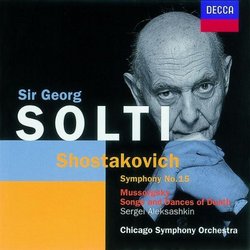| All Artists: Shostakovich, Solti, Cso Title: Symphony 15 Members Wishing: 0 Total Copies: 0 Label: Decca Release Date: 5/11/1999 Genres: Pop, Classical Styles: Vocal Pop, Opera & Classical Vocal, Historical Periods, Modern, 20th, & 21st Century, Symphonies Number of Discs: 1 SwapaCD Credits: 1 UPC: 028945891927 |
Search - Shostakovich, Solti, Cso :: Symphony 15
 | Shostakovich, Solti, Cso Symphony 15 Genres: Pop, Classical
|
Larger Image |
CD Details |
CD ReviewsGreat Symphony/Great Performance R. Kunath | Illinois, USA | 02/29/2000 (4 out of 5 stars) "Solti was an extrovert conductor, and this performance of the 15th Symphony may miss some of the subtleties and ambiguities that pervade this music (my personal favorite in that regard is the Sanderling/Cleveland performance on Erato). That said, this is gripping music making. Solti knows about drama, and the 15th is intensely dramatic. The percussion-haunted ending, recalling Shostakovich's "Leningrad" Symphony is one of the most chilling things you will ever hear. I might add that I attended one of the CSO concerts from which this recording was taken, and it was *electrifying*. It's not exactly Solti's natural idiom, but his bold, unsentimental view of these death-haunted works (note the "Songs and Dances of Death" too!) is not only successful, it's also a testimonial to his own steadfastness in the face of death (he died at the age of 85 only 5-6 months after these concerts). If you only want one 15th, this might not be the one to get: but if you have a couple, I think you'll find this a powerful and moving view of one of the great symphonies of the 20th century. Hail and farewell, Sir Georg!" The tragedy and triumph of Shostakovich Daniel R. Greenfield | Milwaukee, Wisconsin, United States | 07/18/2001 (4 out of 5 stars) "This is an album mostly about death: It was one of Solti's last and shows him very grim-faced on the cover. Given Shostakovich's perennial obsession with death, I'm sure he would have considered that very fitting. Mussorgsky's Songs and Dances of Death is beautifully performed, and the liner notes give not only the original (transliterated) Russian text of the songs, but also their corresponding English translations.
According to Shostakovich's memoirs (Testimony), the Fifteenth deals with many of the same motifs which appear in the late stories of Chekhov, one of Shostakovich's most beloved authors: that life is sadly bittersweet and filled with the strange and unexpected. It is an enigmatic work, and tragic in the same way as Chekhov's story "Rothschild's Violin" is tragic, in a strange, ironic sense. There is no trace of self-pity, just a bittersweet Russian irony that makes you wonder about the stangeness of life. The clock ticking at the beginning and end of the work serve to remind the listener that life is short and so best to keep the hand-wringing to a minimum: you will be dead before long anyway. I like the spin Solti put on this symphony. I especially like the emphatic stress put on that dissonant chord that occurs toward the end of the fourth movement, where Shostakovich seems to be saying "Stop!!". The final percussion ending is also beautifully performed." |

 Track Listings (9) - Disc #1
Track Listings (9) - Disc #1